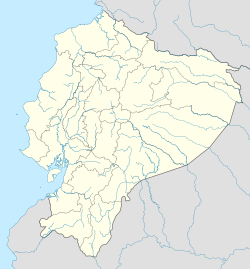Sangolquí
Sangolquí | |
|---|---|
| Coordinates: 0°20′4″S 78°26′51″W / 0.33444°S 78.44750°W | |
| Country | |
| Province | Pichincha |
| Canton | Rumiñahui Canton |
| Area | |
| • Total | 27.17 km2 (10.49 sq mi) |
| Population (2022 census)[1] | |
| • Total | 96,647 |
| • Density | 3,600/km2 (9,200/sq mi) |
| Website | http://www.ruminahui.gob.ec/rumi3/ |
Sangolquí is a suburb of Quito[2] and the seat of Rumiñahui canton in the province of Pichincha, in northern Ecuador. It is connected to Quito by the Autopista General Rumiñahui (General Rumiñahui Highway).
The suburb is home to the prestigious university ESPE, one of the best universities in Ecuador. It is also home to Colegio Liceo del Valle, Colegio Antares, Liceo Naval Quito and "Émile Jaques-Dalcroze" High School, which offers International Baccalaureate and is an authorized centre for University of Cambridge ESOL Examinations. The suburb also holds the football club Independiente del Valle that reached the final of the 2016 Copa Libertadores, won the 2019 and the 2022 Copa Sudamericana.
Sangolquí, along with the rest of Rumiñahui canton, was designated as a Pueblo Mágico by the Ecuadorian Ministry of Tourism (MINTUR) in 2020.[3]
Climate
[edit]| Climate data for Conocoto, elevation 2,550 m (8,370 ft), (1961–1990) | |||||||||||||
|---|---|---|---|---|---|---|---|---|---|---|---|---|---|
| Month | Jan | Feb | Mar | Apr | May | Jun | Jul | Aug | Sep | Oct | Nov | Dec | Year |
| Mean daily maximum °C (°F) | 22.5 (72.5) | 22.6 (72.7) | 22.2 (72.0) | 22.1 (71.8) | 22.7 (72.9) | 22.2 (72.0) | 22.7 (72.9) | 22.7 (72.9) | 23.6 (74.5) | 22.7 (72.9) | 22.2 (72.0) | 22.7 (72.9) | 22.6 (72.7) |
| Daily mean °C (°F) | 15.6 (60.1) | 15.1 (59.2) | 15.3 (59.5) | 15.3 (59.5) | 15.5 (59.9) | 15.1 (59.2) | 15.3 (59.5) | 15.5 (59.9) | 15.5 (59.9) | 15.3 (59.5) | 15.3 (59.5) | 15.6 (60.1) | 15.4 (59.7) |
| Mean daily minimum °C (°F) | 8.0 (46.4) | 7.8 (46.0) | 8.0 (46.4) | 8.3 (46.9) | 8.1 (46.6) | 6.9 (44.4) | 6.8 (44.2) | 6.4 (43.5) | 7.3 (45.1) | 8.0 (46.4) | 8.1 (46.6) | 7.5 (45.5) | 7.6 (45.7) |
| Average precipitation mm (inches) | 72.0 (2.83) | 173.0 (6.81) | 174.0 (6.85) | 210.0 (8.27) | 138.0 (5.43) | 57.0 (2.24) | 20.0 (0.79) | 50.0 (1.97) | 139.0 (5.47) | 183.0 (7.20) | 148.0 (5.83) | 128.0 (5.04) | 1,492 (58.73) |
| Source: FAO[4] | |||||||||||||
References
[edit]- ^ Citypopulation.de
- ^ "2.3. General characteristics of the urban socio-ecosystem in Quito". Urban and Peri-Urban Forestry in Quito, Ecuador: a Case-Study. FAO. Retrieved 16 December 2016.
- ^ "Rumiñahui, el primer Pueblo Mágico de Pichincha". El Comercio. Retrieved 2021-04-02.
- ^ "World-wide Agroclimatic Data of FAO (FAOCLIM)". Food and Agriculture Organization of United Nations. Retrieved 23 June 2024.


 French
French Deutsch
Deutsch
